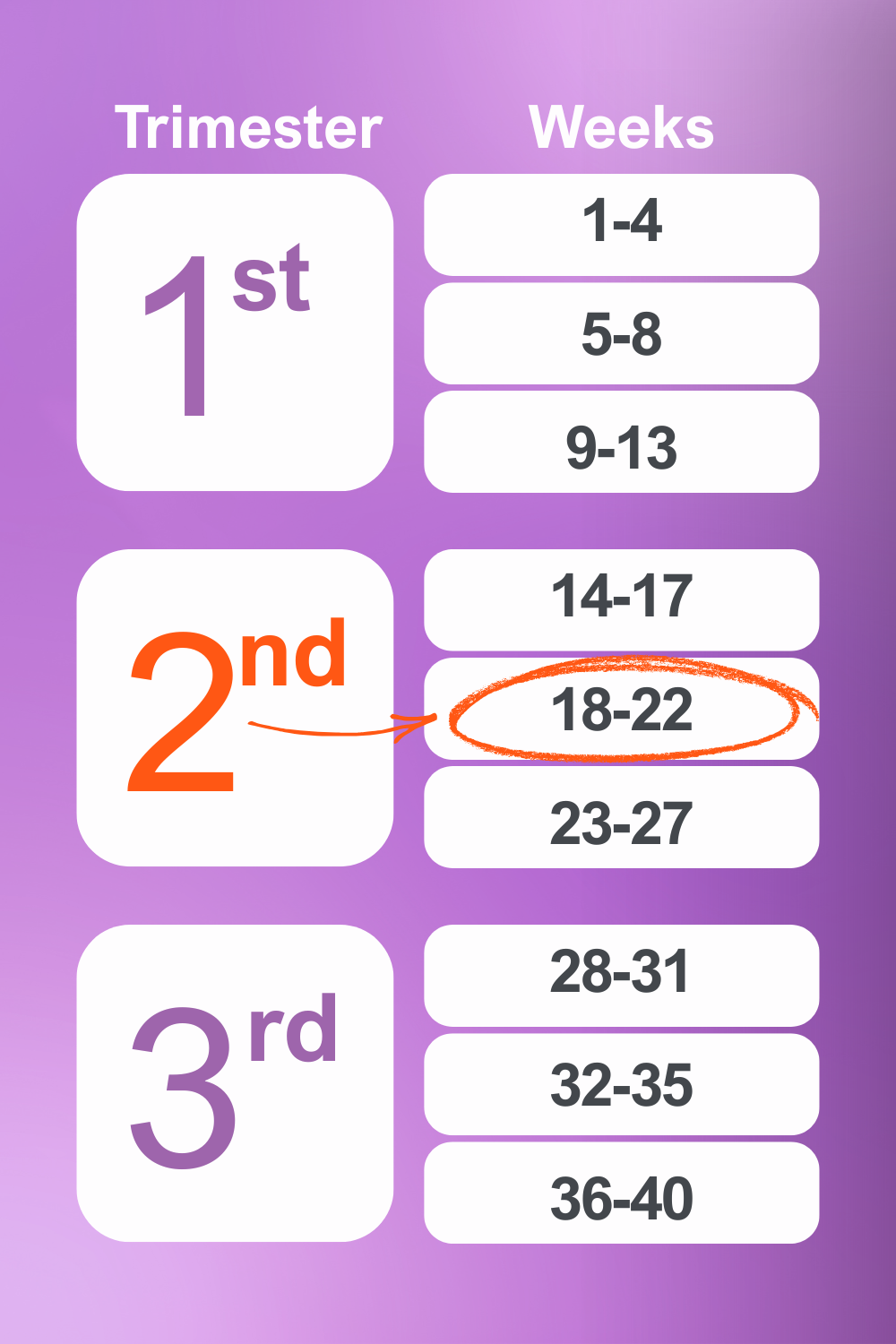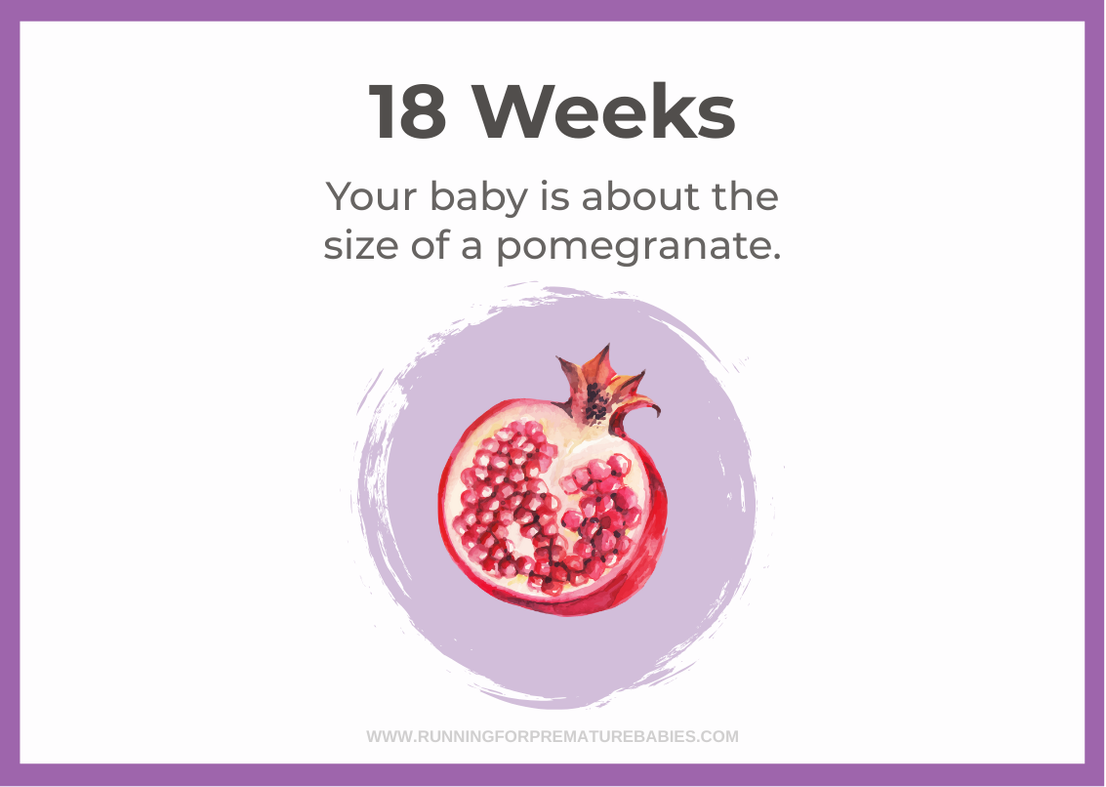Key Milestone Weeks in Pregnancy
Second Trimester

18 Weeks: First movements may be felt (“quickening”); baby’s genitals developed.
Summary:
At 18 weeks pregnant, your baby is moving, stretching, and even resting when you’re active. Their bowel is beginning to fill with meconium, the sticky substance that will become their first nappy change. You might start to feel soft flutters, also known as the “quickening” as they move, although it’s perfectly normal if you don’t just yet. This is also the time for your 18–20 week ultrasound; a detailed scan that checks your baby’s growth and development. You are likely to see their heart beating, limbs waving, and maybe even their little face. If you’d like to know your baby’s sex, this is a good time to ask. Emotionally, you may feel more vulnerable or tired, and that’s okay. You are doing something extraordinary, one day at a time.
At 18 weeks pregnant, your uterus is growing and may begin to press against major blood vessels when you lie down, which can cause light-headedness or dizziness, especially when standing up quickly. This is due to changes in blood flow and the increased demand on your circulatory system. It’s helpful to rise slowly from lying or sitting positions. You may also notice weight gain, which is completely normal as your baby grows. However, how much weight is healthy depends on your pre-pregnancy weight and other individual factors. A balanced, nutritious diet is more important than eating more food overall.

At 18 weeks pregnant, your baby is around 14 cm long and weighs about 200 grams and is growing rapidly and becoming more active. They now have eyebrows, hair, and fingernails, and can yawn and hiccup. Their nervous system is developing, with a protective layer of myelin forming around nerve cells. The bowel is filling with meconium, which will become their first poo after birth.
Your baby’s ears are now in position, and they may begin to hear muffled sounds like your heartbeat or voice, laying the foundation for bonding through sound.
See FAQs Below
Get Involved
Run with us
Donate
Join the Premmie Marathon Challenge
FAQs
What is meconium and why is it forming now?
Meconium is your baby’s first bowel movement, made up of materials they’ve ingested while in the womb, like amniotic fluid, skin cells, and mucus. It’s a thick, sticky, greenish-black substance that begins forming in the baby’s bowel during the second trimester, around 18 weeks. This is a normal part of foetal development and prepares the digestive system for functioning after birth. Meconium is usually passed after birth, but in some cases, it can be released into the amniotic fluid before delivery, which may require monitoring by your healthcare team.
How much weight should I be gaining?
At 18 weeks pregnant, the amount of weight you should gain depends on your pre-pregnancy body mass index (BMI). While there’s no one-size-fits-all number, here are some general guidelines
- If you were in the healthy weight range before pregnancy, a total gain of 11.5-16 kg over the entire pregnancy is typical.
- By 18 weeks, many people have gained around 4-6 kg, but this can vary.
- If you were underweight, overweight, or obese before pregnancy, your recommended weight gain range will differ, and your doctor or midwife can help tailor advice to your needs.
Should I be feeling my baby move around the 18 week mark?
At 18 weeks pregnant, you might start to feel your baby move, often described as gentle flutters, like butterflies in your tummy. This sensation is sometimes called "quickening". However, it’s also completely normal not to feel anything yet, especially if this is your first pregnancy. Many people don’t feel distinct movements until around 20-22 weeks.
What does the 18-20 week ultrasound check for?
The 18-20 week ultrasound, also known as the morphology scan, is a detailed check of your baby’s development. It can check the following:
- Your baby’s growth and development, including organs, limbs, and spine.
- Examines the placenta’s position, the length of your cervix, and amniotic fluid levels.
- Assesses the umbilical cord and blood flow.
- Can detect conditions like spina bifida, congenital heart disease, and limb differences.
- May prompt further testing if any concerns are found.
- Can often reveal your baby’s sex, if you wish to know (although it’s not always guaranteed).
Is dizziness normal at this stage?
Yes, dizziness can be normal at 18 weeks pregnant, and it’s often caused by hormonal changes and increased blood flow. During pregnancy, your blood vessels relax and widen, which can lower your blood pressure and lead to light-headedness or dizziness, especially when standing up quickly or getting out of bed. However, if dizziness is severe, persistent, or accompanied by other symptoms like blurred vision, headaches, or fainting, it’s important to speak with your doctor or midwife, as it could signal something more serious.
Can I find out the sex of my baby now?
Yes, at 18 weeks pregnant, you can usually find out the sex of your baby during the 18-20 week ultrasound scan, also known as the morphology scan.
What emotional changes are common at 18 weeks pregnant?
At 18 weeks pregnant, emotional changes are common and can vary widely. You might feel more vulnerable, tired, or in need of extra support. Some people experience mood swings, anxiety, or low moods, especially if they’ve had mental health challenges in the past. It’s also normal to feel excited, nervous, or even disconnected at times. Hormonal shifts, physical changes, and the reality of becoming a parent can all contribute to these feelings. If you're feeling persistently sad, anxious, or overwhelmed, it's important to talk to your doctor or midwife. Support is available through services like PANDA (Perinatal Anxiety and Depression Australia) and Beyond Blue, and many hospitals have mental health professionals who can help.
Is it safe to sleep on my back at 18 weeks pregnant?
Yes, at 18 weeks pregnant, it is generally safe to sleep on your back, especially if that’s the most comfortable position for you. Sleeping on your back becomes a concern after 28 weeks, when the growing uterus can press on a major vein (the vena cava) and reduce blood flow to your baby. To prepare for later stages, you might start practicing side sleeping now, especially on your left side, which can improve circulation. Using pillows between your legs or under your bump can help make side sleeping more comfortable.
Related reading:
First Trimester
What to expect when you're 3-4 weeks pregnant
What to expect when you're 5 weeks pregnant
What to expect when you're 6-9 weeks pregnant
What to expect when you're 10 weeks pregnant
What to expect when you're 12 weeks pregnant
What to exprect when you're 14 weeks pregnant
Second Trimester
What to expect when you're 18 weeks pregnant
What to expect when you're 20 weeks pregnant
What to expect when you're 22-23 weeks pregnant
What to expect when you're 24 weeks pregnant
What to expect when you're 26-27 weeks pregnant
Third Trimester
What to expect when you're 28 weeks pregnant
What to expect when you're 29 weeks pregnant
What to expect when you're 30 weeks pregnant
What to expect when you're 32-33 weeks pregnant
What to expect when you're 34 weeks pregnant
What to expect when you're 36 weeks pregnant
What to expect when you're 37 weeks pregnant
What to expect when you're 38-40 weeks pregnant
If you would like to run with us, either in memory of a precious baby, to celebrate new life, or simply to add purpose to your fitness journey, click here to find out how you can help give babies a better chance of survival.
Pregnancy, Birth and Baby. (n.d.). Pregnancy week-by-week. Australian Government Department of Health and Aged Care., from https://www.pregnancybirthbaby.org.au/pregnancy-week-by-week. Retrieved 26th July 2025
PANDA – Perinatal Anxiety & Depression Australia. (n.d.). Adjusting to the challenges of parenthood. from https://panda.org.au/articles/adjusting-to-the-challenges-of-parenthood. Retrieved 26th July 2025
Beyond Blue. (n.d.). Research projects. from https://www.beyondblue.org.au/About/Research-Projects. Retrieved 26th July 2025,


